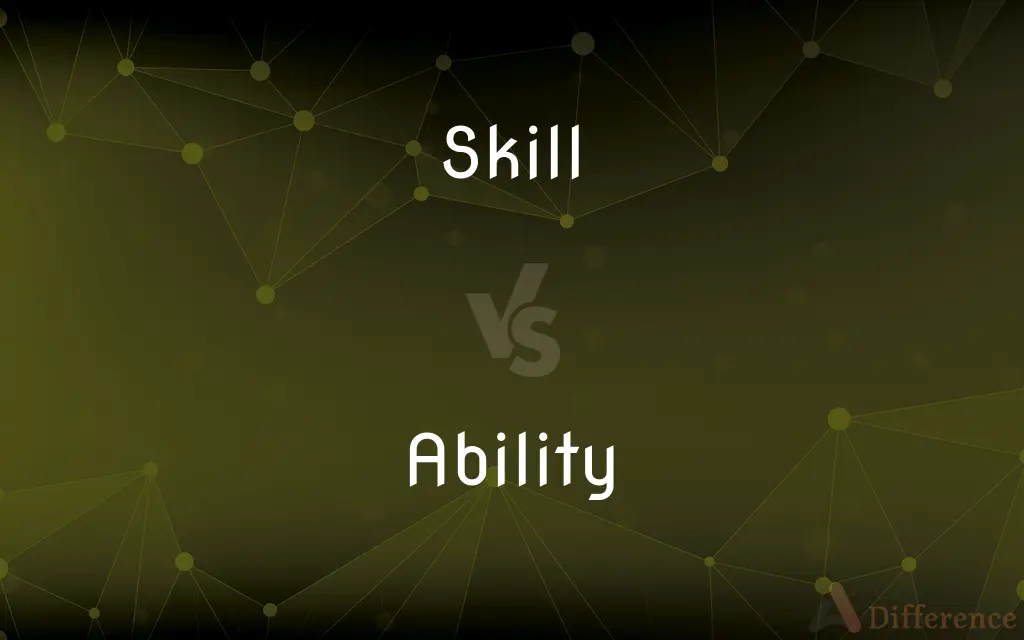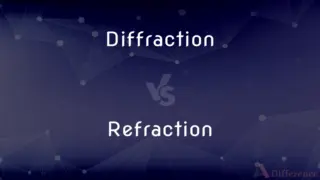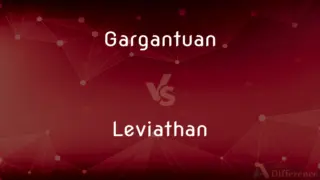Skill vs. Ability — What's the Difference?
By Tayyaba Rehman — Updated on September 23, 2023
Skill refers to a learned capacity to perform specific tasks, while Ability is a natural aptitude or talent to do something.

Difference Between Skill and Ability
Table of Contents
ADVERTISEMENT
Key Differences
Skill and Ability are terms often used interchangeably, but they carry distinct nuances. A Skill is a learned proficiency or competency in performing specific tasks, often acquired through training or experience. On the other hand, Ability denotes a natural talent or aptitude for a particular task, even without formal training.
For instance, an individual might have an innate Ability to understand musical notes, which is a natural gift. However, playing an instrument proficiently requires dedicated practice, translating that Ability into a tangible Skill.
When hiring for a job, employers might seek candidates with specific Skills pertinent to job responsibilities, like proficiency in a software program. However, they might also value inherent Abilities, such as problem-solving or leadership potential, that can be honed into specialized Skills over time.
Education systems worldwide often focus on Skill development, providing training and knowledge in specific fields. However, recognizing and nurturing individual Abilities is equally crucial, as these inherent talents form the foundation upon which Skills can be built.
From a linguistic standpoint, while "Skill" often emphasizes learned techniques, "Ability" focuses more on innate potential. Both words can be pluralized, with "skills" referring to multiple competencies and "abilities" to various natural talents.
ADVERTISEMENT
Comparison Chart
Definition
A learned proficiency or competency
A natural aptitude or talent
Acquisition
Often acquired through training or experience
Inherent and might be present from birth
Contextual Use
Emphasizes specific learned techniques
Highlights innate potential
Development
Can be developed and honed with practice and training
Can be innate but can also be nurtured and developed
Example
Knowledge in software programming
Natural aptitude for understanding complex concepts
Compare with Definitions
Skill
A learned expertise or proficiency.
With enough practice, he honed his painting Skill.
Ability
The capacity to do or achieve something.
The Ability to multitask is crucial for that role.
Skill
The use of expertise to accomplish a task.
It takes Skill to assemble that intricate model.
Ability
Physical or mental power to perform.
Despite his age, he retains the Ability to run long distances.
Skill
A skill is the learned ability to perform an action with determined results with good execution often within a given amount of time, energy, or both. Skills can often be divided into domain-general and domain-specific skills.
Ability
A natural talent or quality.
She has an innate Ability to connect with animals.
Skill
Proficiency, facility, or dexterity that is acquired or developed through training or experience
Painted with great skill.
Ability
Power or competence in a specific area.
His mathematical Ability is commendable.
Skill
A developed talent or ability
Improved his writing skills.
Ability
Suitability or capability in a particular role.
The job requires the Ability to handle stress.
Skill
An art, trade, or technique, particularly one requiring use of the hands or body
The skill of glassmaking.
Ability
Possession of the means or skill to do something
The manager had lost his ability to motivate the players
Skill
(Obsolete) A reason; a cause.
Ability
Talent, skill, or proficiency in a particular area
Pupils of all abilities
A man of exceptional ability
Skill
Capacity to do something well; technique, ability. Skills are usually acquired or learned, as opposed to abilities, which are often thought of as innate.
Where did you pick up that skill?
With great skill, she navigated through the tricky passage.
Doing that coaching course not only taught me useful skills on the field, but also some important life skills.
Ability
The quality of being able to do something, especially the physical, mental, financial, or legal power to accomplish something.
Skill
(obsolete) Discrimination; judgment; propriety; reason; cause.
Ability
A skill, talent, or capacity
A student of many abilities.
Skill
(obsolete) Knowledge; understanding.
Ability
The quality of being suitable for or receptive to a specified treatment
The ability of a computer to be configured for use as a file server. See Usage Note at able.
Skill
(obsolete) Display of art; exercise of ability; contrivance; address.
Ability
(obsolete) Suitableness.
Skill
Great, excellent.
Ability
(uncountable) The quality or state of being able; capacity to do or of doing something; having the necessary power.
This phone has the ability to have its software upgraded wirelessly.
This wood has the ability to fight off insects, fungus, and mold for a considerable time.
Skill
(transitive) To set apart; separate.
Ability
The legal wherewithal to act.
Skill
To discern; have knowledge or understanding; to know how (to).
Ability
Physical power.
Skill
To know; to understand.
Ability
(archaic) Financial ability.
Skill
(intransitive) To have knowledge or comprehension; discern.
Ability
(uncountable) A unique power of the mind; a faculty.
Skill
(intransitive) To have personal or practical knowledge; be versed or practised; be expert or dextrous.
Ability
(countable) A skill or competence in doing; mental power; talent; aptitude.
They are persons of ability, who will go far in life.
She has an uncanny ability to defuse conflict.
A mixed-ability class
Skill
To make a difference; signify; matter.
Ability
The quality or state of being able; power to perform, whether physical, moral, intellectual, conventional, or legal; capacity; skill or competence in doing; sufficiency of strength, skill, resources, etc.; - in the plural, faculty, talent.
Then the disciples, every man according to his ability, determined to send relief unto the brethren.
Natural abilities are like natural plants, that need pruning by study.
The public men of England, with much of a peculiar kind of ability.
Skill
(video games) To spend acquired points in exchange for skills.
Ability
The quality of being able to perform; a quality that permits or facilitates achievement or accomplishment
Skill
Discrimination; judgment; propriety; reason; cause.
For great skill is, he prove that he wrought.
Ability
Possession of the qualities (especially mental qualities) required to do something or get something done;
Danger heightened his powers of discrimination
Skill
Knowledge; understanding.
That by his fellowship he color mightBoth his estate and love from skill of any wight.
Nor want we skill or art.
Skill
The familiar knowledge of any art or science, united with readiness and dexterity in execution or performance, or in the application of the art or science to practical purposes; power to discern and execute; ability to perceive and perform; expertness; aptitude; as, the skill of a mathematician, physician, surgeon, mechanic, etc.
Phocion, . . . by his great wisdom and skill at negotiations, diverted Alexander from the conquest of Athens.
Where patience her sweet skill imparts.
Skill
Display of art; exercise of ability; contrivance; address.
Richard . . . by a thousand princely skills, gathering so much corn as if he meant not to return.
Skill
Any particular art.
Learned in one skill, and in another kind of learning unskillful.
Skill
To know; to understand.
To skill the arts of expressing our mind.
Skill
To be knowing; to have understanding; to be dexterous in performance.
I can not skill of these thy ways.
Skill
To make a difference; to signify; to matter; - used impersonally.
What skills it, if a bag of stones or goldAbout thy neck do drown thee?
It skills not talking of it.
Skill
An ability that has been acquired by training
Skill
Ability to produce solutions in some problem domain;
The skill of a well-trained boxer
The sweet science of pugilism
Skill
The ability to do something well.
Her Skill in negotiations saved the deal.
Skill
A particular talent or type of ability.
Communication is an essential Skill in any profession.
Skill
Mastery or dexterity in a particular area.
His Skill in chess is unparalleled.
Common Curiosities
Physical or mental power to perform.
Despite his age, he retains the Ability to run long distances.
Power or competence in a specific area.
His mathematical Ability is commendable.
Are all Skills based on Abilities?
Not necessarily. Some Skills can be learned even without a foundational Ability.
Can Abilities be turned into Skills?
Yes, with the right training and practice, Abilities can be honed into Skills.
Can you have an Ability but lack Skill in a particular area?
Yes, for example, one might have a musical Ability but might not have the Skill to play an instrument.
A natural talent or quality.
She has an innate Ability to connect with animals.
Is it easier to learn a Skill if you have a related Ability?
Often, having a related Ability can make it easier to acquire and master a Skill.
The capacity to do or achieve something.
The Ability to multitask is crucial for that role.
Can Skills be forgotten?
Yes, Skills can diminish or be forgotten without regular practice.
Are Skill and Ability the same?
No, Skill is a learned proficiency, while Ability is a natural aptitude or talent.
How are Skills typically acquired?
Skills are often acquired through training, education, or experience.
Suitability or capability in a particular role.
The job requires the Ability to handle stress.
Can Abilities be improved?
Yes, with consistent practice and nurturing, Abilities can be enhanced.
Are there tests to determine Abilities?
Yes, there are various aptitude tests designed to gauge specific Abilities.
Do Abilities diminish over time?
Some Abilities might wane with age or lack of use, but many remain inherent.
Which is more valuable: Skill or Ability?
Both are valuable. Skills show expertise and training, while Abilities highlight innate potential.
Is every Ability noticeable from birth?
Not always. Some Abilities might become evident later in life.
Can one possess multiple Skills and Abilities?
Absolutely. Individuals can have varied Skills and Abilities across different areas.
How does talent differ from Ability?
Talent often refers to a notable level of Ability, especially in artistic fields.
Share Your Discovery

Previous Comparison
Diffraction vs. Refraction
Next Comparison
Gargantuan vs. LeviathanAuthor Spotlight
Written by
Tayyaba RehmanTayyaba Rehman is a distinguished writer, currently serving as a primary contributor to askdifference.com. As a researcher in semantics and etymology, Tayyaba's passion for the complexity of languages and their distinctions has found a perfect home on the platform. Tayyaba delves into the intricacies of language, distinguishing between commonly confused words and phrases, thereby providing clarity for readers worldwide.














































